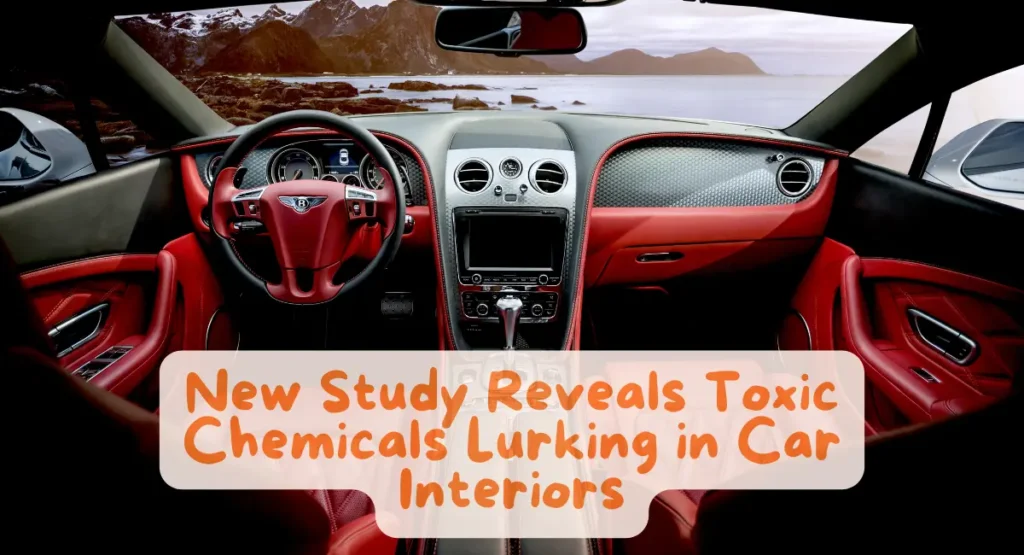Date: May 21, 2024

New Study Reveals Toxic Chemicals Lurking in Car Interiors. In a recent study conducted by environmental researchers, alarming findings have emerged regarding the presence of toxic chemicals in car interiors.
The study, which sheds light on potential health risks for drivers and passengers, has raised concerns among experts and consumers alike. The research, carried out over a span of several months, involved analyzing samples from various car interiors, including seats, dashboards, and steering wheels.
The results indicate the existence of a wide range of hazardous chemicals, many of which are known to have detrimental effects on human health. Among the toxic substances identified in the study are volatile organic compounds (VOCs), which are emitted as gases from certain materials used in car manufacturing.
These VOCs, such as benzene, formaldehyde, and styrene, have been linked to respiratory issues, allergic reactions, and even potential long-term health complications. Furthermore, the study found that the levels of these chemicals were particularly high in newer car models, possibly due to the increased use of synthetic materials and adhesives during manufacturing processes.
This raises concerns for both drivers and passengers, who may unknowingly be exposed to these harmful substances during their daily commutes or long journeys.
Experts are urging car manufacturers to take immediate action to address this issue and prioritize the use of safer materials in their vehicles. Additionally, they emphasize the importance of proper ventilation systems and regular maintenance to mitigate the concentration of toxic chemicals inside cars.
The implications of this study extend beyond the health risks associated with car interiors. As people spend a significant amount of time in their vehicles, especially during long commutes or road trips, the exposure to these toxic chemicals becomes a pressing concern.
It is crucial for individuals to be aware of the potential hazards and take necessary precautions to minimize their exposure. Consumer awareness and education are vital in addressing this issue.
Car owners are advised to keep their vehicles well-ventilated, especially when parked in hot conditions, as high temperatures can accelerate the release of toxic chemicals. Regular cleaning and vacuuming of car interiors can also help reduce the accumulation of dust and potential chemical residues.
In response to these findings, regulatory bodies and consumer advocacy groups are calling for stricter regulations and standards in car manufacturing. They believe that increased transparency regarding the use of materials and the potential health risks associated with them is essential for consumer safety.
As the public becomes more informed about the presence of toxic chemicals in car interiors, there is a growing demand for safer alternatives and sustainable practices within the automotive industry. This study serves as a wake-up call for manufacturers and consumers alike to prioritize health and safety when it comes to the vehicles we drive.
Also read 10 Home Remedies For Urine Infection In Ayurveda|Take control of your health today!
car interior
Are there any specific recommendations or guidelines provided by experts to minimize exposure to toxic chemicals in car interiors?
Yes, experts have provided specific recommendations and guidelines to minimize exposure to toxic chemicals in car interiors. Here are some of their suggestions: 1. Proper Ventilation: Ensure adequate ventilation in your car by opening windows or using air conditioning. This helps to reduce the concentration of toxic chemicals and allows fresh air to circulate. 2. Avoid High Temperatures: Avoid parking your car in direct sunlight or in hot conditions for extended periods. High temperatures can accelerate the release of toxic chemicals from materials used in car interiors. 3. Regular Cleaning: Regularly clean and vacuum your car’s interior to remove dust, dirt, and potential chemical residues. Pay attention to carpets, seats, and dashboard surfaces. 4. Avoid Smoking: Avoid smoking or allowing others to smoke inside the car. Cigarette smoke contains harmful chemicals that can further contribute to air pollution within the car. 5. Use Safer Cleaning Products: When cleaning your car’s interior, opt for non-toxic and environmentally friendly cleaning products. Avoid using products that contain harsh chemicals that can add to the chemical load in the car. 6. Check for Recalls or Safety Notices: Stay updated on any recalls or safety notices issued by car manufacturers regarding potential chemical hazards in specific car models. Follow the manufacturer’s recommendations for addressing such issues. 7. Seek Professional Help if Necessary: If you suspect a strong chemical odor or experience persistent health issues related to your car’s interior, consult a professional car detailer or an automotive expert for assistance in identifying and resolving the problem. By following these recommendations, individuals can minimize their exposure to toxic chemicals present in car interiors and promote a healthier and safer driving environment.



